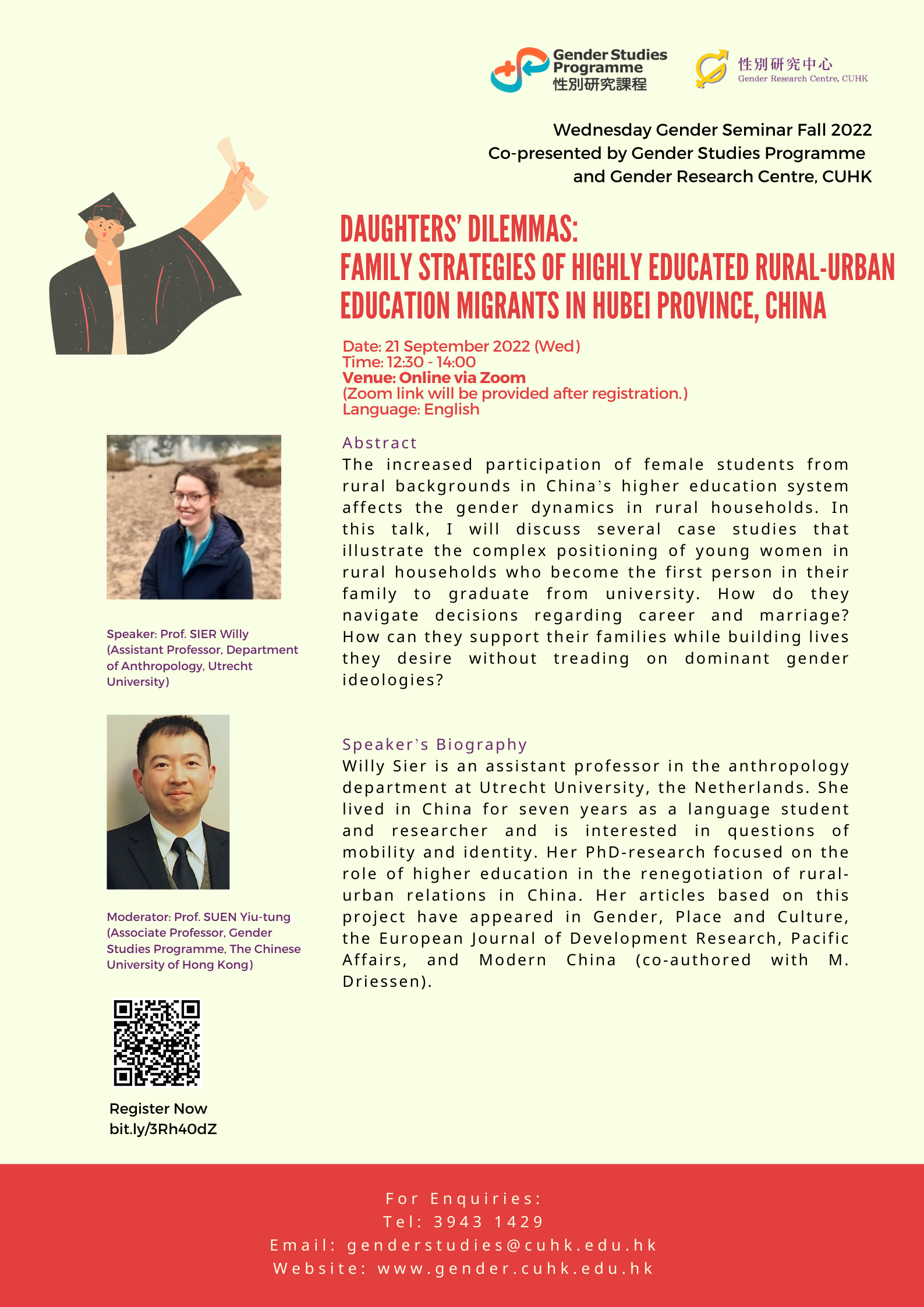Prof. SIER Willy, in her talk, revealed how female university graduates, as the first and only bachelor’s degree holder in her rural family, experienced various intersecting social processes that were shaped by both the structural condition of China’s social transformation and their dual roles, i.e., the role of daughters in the rural household, and the role of migrant female university graduates working in the city. The author conducted ethnographic research in Hubei province, one of China’s ‘big education provinces’ with rich educational resources and a huge number of university students. With the rapidly changing conditions in rural China and the expansion of China’s higher education system, university enrolment by young women of rural origin has increased exponentially. However, these young female ‘education migrants’ continue to struggle with the exclusion of rural citizens in cities and the entrenched patriarchal family culture in rural China. They are expected to use their gender and educational achievements to provide support to their families through their urban earnings and marriage. For instance, in one of the two cases that the speaker showed, the respondent’s mother required her to get married soon to somebody with a high bride price in order to finance her brother’s marriage. This case also revealed that those highly-educated female migrants’ contributions to their rural households resulted from elaborate negotiation processes with their family members. Additionally, the study emphasized that those highly-educated female education migrants from rural China are not a homogeneous group: one respondent was keen to pursue a career and maintain her independence, while another expressed her desire to help strengthen both her own and her family’s social and economic standings through marriage. Overall, gender, rurality, and migration are indicated to put multi-pressure on female university graduates from rural backgrounds, and their ‘education migration’ brought their intense negotiations with rural households, which reconfigure the gendered household dynamic in rural China.
Written by: GU Yuxuan
On September 21st, the Wednesday Seminar was successfully held, presented by Prof. Willy Sier, the assistant professor of the anthropology department of Utrecht University who has lived in mainland China for seven years.
Prof. Sier’s pointed out that expanding urbanization and higher education opportunities have made education increasingly crucial for rural families. Hubei, a wealthy province with a well-established higher education system, was attracting an increasing influx of education migrants. During Prof. Sier’s fieldwork in Wuhan between 2015-2017, she spoke to several young, first-in-the-family, highly educated women who face the dual pressures of their families and city lives. Prof. Sier deemed that their contribution to families goes beyond the existing literature, including the sacrifice of economy, emotion, and even personal desire.
Prof Sier discussed two case studies. One was Julia, who came from a single-parent family and took on much of the responsibility of supporting her mother’s retirement and her brother’s marriage after graduation. Faced with her mother’s urging for marriage, Julia doubted the necessity of getting married as a city woman and believed that marriage might deprive her of the legitimacy of raising her family of origin as a rural daughter. Professor Sier argued that this case showed how the identity and mobility brought by educational migration give rise to complexity in gender roles, marital relations, property distribution, and kinship in rural Chinese households.
The other was Misty, an interlocutor who graduated from a junior college. Misty returned to her hometown and entered an unromantic marital relationship after the challenging career choice and financial crisis after graduation. This case prompted Prof. Sier to reflect on how inflation in higher education has caused a gap between employment choices and career dreams, especially for women with rural backgrounds.
Prof. Sier observes that almost every interlocutor shows ambitions in the future while diligently navigating a social landscape in which their positions are shaped by gender, educational achievements, and rural status, as well as societal structures, including marriage and labor markets. From the Pandemic to today, Prof Sier remains in contact with interlocutors remotely. Although these cases may not be representative, Prof Sier believes these anthropological studies provide academic value in understanding how intersecting social structures have shaped the lives of the increasing number of young women with higher education backgrounds and shifted dynamics in their rural families.
Written by: HUANG Minyan
The research is based on the background of rural labour migrants. Young people from rural backgrounds increasingly moved to cities by enrolling in universities due to land consolidation, low pay for working in leading local enterprises, and the explosive growth of the Chinese higher education system. Professor Willy Sier examined how higher education affected university-educated daughters in rural households of their employment prospects, but also how this made sense within broader gender ideologies and labour market contexts.
She argued that highly educated young women contribute to the family in a way that goes beyond what we know from the literature as they contribute financially and emotionally and sometimes even sacrifice their ambitions to contribute to the family projects, such as helping their brother marry. She showed two cases.
First is Julia’s story; being the only person in a family with a degree, she feels responsible for ensuring her brother’s and mother’s life. She cannot consider getting married because she thinks it’s unfair for her husband and child to continue supporting her original family. Julia’s case connects two sets of questions, those about the emancipating potential of higher education for young women and questions about daughters’ role in rural Chinese households. It is often suggested that education is an important tool for promoting gender equality. But we see that Julia’s achievements and energy are directed towards securing property for her brother and that she continuously needs to prioritize her family’s needs over her desires.
The second case is Misty. Misty puts family needs ahead of her own emotional attachments when choosing a mate. Working in a factory had been an essential part of the marriage negotiation because being an accountant made her also an attractive person to marry into this family that had a factory. But her dream is to be a teacher, and don’t want to work in a factory.
Their educational trajectories have always been important to them. However, they also navigate a social landscape in which their positions are shaped by their gender, educational achievements, rural status, and societal structures, including marriage labour markets.
Written by: JIN Shuyi





A
A
A
Contact Us